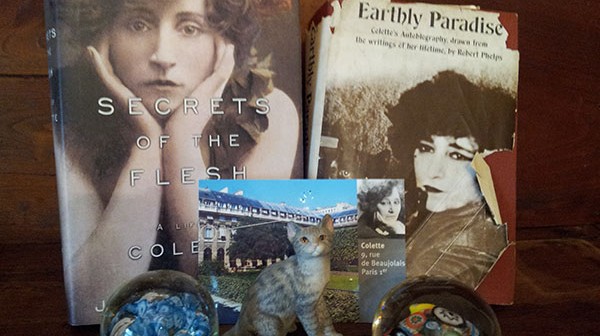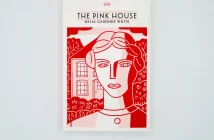For inspiration the other day, I pulled out my Capote Reader, turned to page 628 and read the “The White Rose,” a short essay about Mr. Capote’s visit with Colette during the late 1940s. The great French writer had invited Truman for tea at 4 o’clock in her Palais Royal apartment, grace a an introduction by friend and neighbor Jean Cocteau. Mr. Capote was in his lithe young twenties and had published the novel Other Voices, Other Rooms (which Colette had never heard of). In turn Colette, by then an old lady crippled up with arthritis who stayed in bed with her cats, had a staggering legacy of 50 novels, memoirs, short stories, letters, and portraits. She was considered as great a writer in France as Proust.
While Colette stretched out on her bed, grey cat on lap, the two writers drank tea and chatted. Towards the end of the visit, Mr. Capote admired her collection of antique paperweights and she reached over and handed him a Baccarat crystal of a single white rose, circa 1848. A gift from her. Mr. Capote went on to collect antique paperweights – a ruinous expensive habit he called it – and later in life he travelled with at least six of his favorites, wrapped in flannel, packed lovingly in a little black bag. He said they made a sterile hotel room warmer, homier. Something to stare at when he couldn’t sleep at night.
I spent my junior year in college in Paris and a when a teacher assigned my class short stories by Colette I wondered Who’s that? Even struggling with a dictionary, I was swept away by the richness of her descriptions, the power and beauty of her writing. I can honestly say she has had more influence on me that any other writer. And it was not dull to read about her life which was just as rich as her writing: a Burgundy village girl winds up in Paris, marries a cad music critic much her senior who is titillated by her stories of growing up and encourages her to write them down to the point sometimes he locked her in her room so she would write. The Claudine novels became bestsellers. Never mind that Monsieur Willy took credit for them and kept the royalties. Colette eventually divorced him and what followed were years in theaters and music halls as a mime and dancer, three marriages, girlfriends (!), two World Wars, The Occupation (and one of her husbands was Jewish), having a baby at 40 – like me though I’m a better mother – owning a beauty salon: all of this went down on paper.
The main thing I learned from Colette was how to describe, how to observe, and how to use the force of Mother Nature in my writing. In quiet action and detail find great drama. “Look,” she told a young writer. “Look for a long time at what pleases you and longer still at what pains you. . .” And I can’t think of another writer who makes the world of nature, love, loss and passion explode on a page like Colette does. Her prose reads like poetry and will pull you in. The dust jacket of one of my copies of The Vagabond says she was the “trailblazer for feminist fiction”; The Los Angeles Times called her “the supreme portrayer of the female heart.” I also have copies of Claudine, The Ripening Seed, The Other One, Earthly Paradise, The Tender Shoot, and Journey for Myself, most of which my husband has given me as gifts. Plus, I have Judith Thurman’s biography Secrets of the Flesh which is thorough, but sometimes I wish I hadn’t read it because it’s warts and all. The books in my Colette library are torn, stained, and tired, reminding me of the countless nights I’ve fallen asleep with one propped open on my chest.
A long time ago my husband and I bought a sailboat and named her Colette.
When I return to Paris – which won’t be for awhile because I have to pay for my daughter’s college – I am going to treat myself to a Colette-fest. I’ll go to Pere Lachaise and place a flower in one of the urns on her grave. I’ll stroll down the sidewalks near her apartment at Palais Royal and then I’m going to take my handsome husband to Café Grand Vefour where she often ate and we’re going to have a lunch that costs as much as one of my quarterly tax payments. We’re going to hold hands, well, maybe not that, he doesn’t like PDA, but we’re going to sit in that sumptuous Louis XVI setting and eat turbot coupe epais cuit meuniere and lift a glass of Moet in her honor. I feel I owe her this after all the pleasure and guidance her writing has given me.
By means of an image we are often able to hold on to our lost belongings. But it is the desperateness of losing which picks the flowers of memory, binds the bouquet.
Mes Apprentissages (1936)



